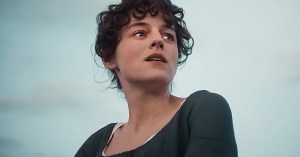Ebertfest 2006: Festival Ends "Bad"-ly
Saturday at Roger Ebert’s Overlooked Film Festival — the last full day of screenings — was a day that challenged the audience’s sense of ethics and empathy.
The day kicked off with the festival’s free family matinee — a film chosen precisely for a family audience. And Danny Boyle‘s "Millions" could not have been a better choice — a movie about kids who unearth a mountain of money and then deal with the ethical implications of what they’ve found, and what they should do with their new wealth.

Lewis Owen McGibbon and Alex Etel in "Millions"
Part of the film depicts these kids interacting with an array of dead saints who visit them to offer guidance on both the money and their moral quandary. And while that was always the one aspect of the film I thought felt forced — trying a bit too hard to incorporate a religious debate into the story — anyone who saw the film here in Champaign, and witnessed the post-film Q&A between Ebert and a number of local kids, now knows how powerfully these religious scenes engage and awaken younger viewers.
These kids were indeed fascinated by these saints, and the religious implications of the story. And as Ebert discussed the film with them seriously and contemplatively, I have never been more convinced of the intelligence of younger audiences. So many family films offer cheap, simple humor that I think sells children short. And indeed, these kids could follow Boyle’s story, and consider its more profound ideas, just as well as any mainstream adult audience.
I think a subtext to all eight of these Overlooked Film Festivals has been the observation that one of the most overlooked demographics in mainstream Hollywood is that of children. With each year’s family matinee, Ebert has chosen films that do not cater to simplistic notions of what children want, but rather has selected stories that consider children as serious, discerning viewers.
And as far as 2006 is concerned, "Millions" continues this tradition. It is a captivating film, and the onstage reaction to the movie proved that fact.
Next up was "Claire Dolan," which even Ebert admitted could not have represented a more dramatic shift of tone. However light-hearted "Millions" may have seemed, "Claire Dolan" is a shocking, sobering affair about a prostitute, a pimp, and a life that is almost lost to despair.
Almost.
What’s most captivating about this 1998 film, which was never given the chance to find a mainstream audience (seems to be a theme here), is that all its characters truly seem to have a sense of free will. Unlike most films, in which characters seem to be going through the traditional motions, here director Lodge Kerrigan continues to show us his characters in different lights, and asks us to consider them for who they truly are, not who they pretend to be.
It’s about a prostitute (played by the late brilliant Katrin Cartlidge) who goes through her life trying to repay a debt to her pimp — who does not see sex as something intimate, but as her own daily form of torture. And we see how it destroys her existence. When her mom dies, she tells the nurse that she must rush to an appointment — a sexual encounter which, if she doesn’t fulfill, will anger her pimp. When she tries to escape and make a clean break, she’s tracked down and brought back to her old life as a prisoner. When she meets a potential lover, and expresses her desire for a child, she sees his love evaporate into a haze of disgust — as he comes to see her just like her clients do.
In a post-film discussion with Kerrigan — whom Ebert called one of his personal heroes in making only films he wanted the make and only in the way he wants to make them — the filmmaker celebrated his film’s ambiguity. The notions of good and bad, of traditional and subversive, are flipped around in "Claire Dolan," and he said the inspiration for the story came from his days in New York City, when the idea of a pregnant prostitute sent his mind reeling. What must it be like, he wondered, when the roles of the maternal woman and the sexualized woman collide?
This non-judgmental theme was evident throughout Saturday at the Overlooked. Not only apparent in "Millions," where children make us question what we would do with a mountain of money, and in "Claire Dolan," in which a prostitute confronts us with the perspective of someone who has seen the worst of human nature, the day’s third film, "Junebug," gives us a similar story of a southern American family preparing for the homecoming of their oldest son, who has moved to Chicago, and the struggles they face in relating to both their son and his new wife, whose urban lives make them foreigners to this quiet, tranquil corner of the world.

Amy Adams’s Oscar-nominated performance in "Junebug"
After playing to a packed house at the gorgeous Virginia Theater, director Phil Morrison seemed to appreciate Ebert’s claim that the film loves all its characters, but he also offered a slight modification to the wording. Rather than seeing all the characters in this family as protagonists, Morrison instead put it another way: That if we keep ourselves from seeing anyone as an antagonist, or try hard to maintain empathy for those we might not even understand, then we open ourselves to accepting each character in "Junebug" on their own terms.
The difference was that Ebert seemed to love all these people; Morrison seemed happier that his film managed to avoid hating any of them. Either way, the film — which earned actress Amy Adams an Academy Award nomination — is quite a beautiful work.
And rounding out the day was the one film that violated the non-judgmental theme of the day. Terry Zwigoff‘s "Bad Santa," which might be the most gleefully offensive mainstream comedy of the last decade, constantly asks us to judge Billy Bob Thornton, who plays the story’s cynical, alcoholic, nihilistic mall Santa — though it also makes it quite clear that no matter how much we might judge him, this Santa just doesn’t give a shit.

Billy Bob Thornton makes Christmas dreams come true, kinda…
Presenting what he terms a "badder Santa," or make that the "baddest Santa," Zwigoff said the cut presented as part of the Overlooked represents the original cut he submitted to the studio, before focus groups and studio revisions required him to alter the film. All that being said, I did not notice many substantial changes to the story, beyond a more gruesome death for the department store’s security manager and a handful of shots that played more with exaggerated comic timing. In this original cut, Zwigoff will often linger longer on a horrific moment or an ugly image, presenting us with it just long enough so that it reaches that second or third laugh. Almost like a Mel Brooks film, Zwigoff holds his camera on something and then keeps holding, and keeps holding, until you can’t help but chuckle at just how crude this comedy really is.
The post-film Q&A, with both Zwigoff and editor Robert Hoffman, offered yet more evidence on how absurd the whole focus group mentality is. And perhaps the biggest understatement of the festival came from Ebert as he reacted to the riotous "Bad Santa" screening, which sent the audience into hysterics. After taking the stage and introducing his two guests, Ebert picked up his mic and said simply, "It plays."
After yet again witnessing this festival that has become so near and dear to my heart — as well as hundreds of other movie fans who could be heard in the hallways discussing this year’s festival as the fourth, fifth, sixth or seventh they have attended — I think it can safely be said that all these films play.
It’s just that so few have the opportunity.
As the stakes go up, with higher production budgets, more competition from DVDs and cable, and a more cramped marketplace that values opening weekend box office receipts above all else, it will continue to be harder and harder for these titles to get a chance in the theater.
And that’s a shame.
The Overlooked Film Festival is partly a celebration of those films that not enough people will get a chance to see. But it’s also a condemnation of a marketplace that won’t give these films a real chance to make it — won’t allow films like this to open with the kind of marketing or patience that will allow audiences to find them.
To park one’s car in downtown Champaign and to walk over to the Virginia Theater is to enter movie heaven, knowing that, for at least these five days, we can celebrate the kind of cinema that seeks to be art.
And to see that another year is coming to and end, and that 360 days separate us from Ebert’s ninth overlooked festival in 2007, is to be saddened by the realization that now we must return to our weekly quest, wading through the mediocrity in search of those precious gems.
Check out these films, these directors, and all of the audio from the festival that is now available online. You can find everything you’d ever want to know on both www.eberfest.com and www.rogerebert.com. Thanks for letting me be your guide.
Author: Steven Snyder
Steven Snyder is a regular contributor to Zertinet Movies (www.zertinet.com) and Greater Milwaukee Today Newspapers






